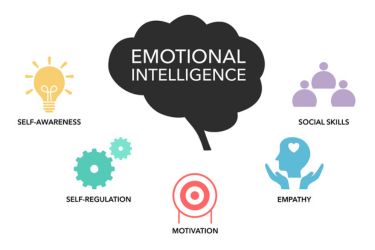Emotional intelligence plays a crucial role in how we cope with challenges and bounce back from setbacks. It enhances our mental resilience, enabling us to handle stress and adversity more effectively. By understanding and managing our emotions, we can improve our response to difficult situations, making us more adaptable and stronger in the face of life's ups and downs.

Research shows a strong connection between emotional intelligence and resilience. Those who recognise their feelings and the emotions of others tend to navigate tough times with greater ease. This ability not only supports personal well-being but also fosters healthier relationships, as we learn to empathise and communicate better with those around us.
As we explore the relationship between emotional intelligence and mental resilience, we will uncover practical strategies for developing these skills. Whether it's managing our stress better or understanding our emotional responses, enhancing our emotional intelligence can significantly impact our resilience and overall mental health.
Understanding Emotional Intelligence

Emotional intelligence is essential for recognising and managing our emotions and those of others. It plays a significant role in our interactions and mental resilience. We will explore the fundamentals of emotional intelligence, its key components, and the distinctions between trait and ability emotional intelligence.
Fundamentals of Emotional Intelligence
Emotional intelligence (EI) refers to our ability to understand and regulate emotions. It involves self-awareness, allowing us to recognise our feelings and their impact on our thoughts and behaviours. This awareness is crucial because it helps us respond constructively rather than react impulsively.
Self-regulation goes hand in hand with self-awareness. We can manage our emotions and adapt to changing situations through self-regulation. This skill helps us remain calm under pressure and make better decisions. By developing these foundational aspects, we enhance our capacity to face challenges and build resilience.
Components of Emotional Awareness
Emotional awareness is a core part of emotional intelligence. It includes recognising our emotions and understanding why we feel a certain way. This understanding allows us to label and express our emotions healthily. Being aware of our emotions makes it easier to communicate with others and respond to their feelings.
Additionally, emotional awareness helps us identify the emotions of those around us. This skill builds empathy, which is necessary for strong relationships. Motivation also ties into emotional awareness, as understanding our feelings can inspire us to pursue goals and overcome obstacles.
Trait vs. Ability in Emotional Intelligence
There are two main views of emotional intelligence: trait and ability. Trait emotional intelligence focuses on an individual's characteristics and behaviours. It includes personality traits that determine how we tend to express and manage our emotions.
Ability emotional intelligence, on the other hand, measures our capacity to perform emotional tasks. This includes recognising emotions in others and using that recognition to guide our thinking and actions. Both aspects are essential for effective emotional functioning and can influence our mental resilience significantly.
The Relationship Between Emotional Intelligence and Mental Health

Emotional intelligence (EI) plays a significant role in our mental health. By understanding and managing our emotions, we can better handle challenges like stress and anxiety. This section explores how EI predicts mental well-being and its impact on issues like depression and anxiety.
Emotional Intelligence as a Predictor of Mental Well-being
Research shows that higher emotional intelligence is linked to better mental health outcomes. Individuals with high EI tend to have strong coping skills. They manage stress effectively and find solutions to emotional challenges.
Key indicators of high emotional intelligence include:
- Self-awareness: Recognising our emotions and triggers.
- Emotional regulation: Controlling emotional responses in difficult situations.
- Empathy: Understanding and relating to others' feelings.
These skills help us build resilience, leading to lower psychological symptoms. With better emotional balance, we can navigate life’s ups and downs more successfully.
Influence of Emotional Intelligence on Depression and Anxiety
Emotional intelligence significantly impacts depression and anxiety levels. Those with lower EI often struggle with these conditions. They may have difficulty identifying their feelings, leading to poor coping strategies.
Studies indicate that improving our emotional intelligence can help reduce symptoms of anxiety and depression. For instance:
- Individuals with high EI can manage stress better.
- They often seek social support when facing challenges.
- Their ability to process emotions allows for healthier responses to setbacks.
By fostering emotional intelligence, we can create a buffer against mental health issues, enhancing our overall well-being. This highlights the importance of developing EI in various settings, including education and workplaces.
Building Resilience Through Emotional Intelligence

Emotional intelligence plays a crucial role in fostering resilience. By improving our ability to manage emotions, we enhance our capacity to cope with challenges. This section discusses specific aspects of how emotional intelligence contributes to resilience.
Coping Mechanisms and Emotional Management
Effective coping mechanisms stem from strong emotional management. When we recognise our feelings, we can respond in healthier ways. This includes understanding triggers and developing strategies to handle stress.
Practising mindfulness can help us stay centred during tough times. Techniques like deep breathing, journaling, or talking to a friend can enhance our awareness. Developing these coping skills allows us to navigate distress more effectively.
Key strategies include:
- Mindfulness techniques: Focus on the present moment.
- Seeking support: Engage friends or professionals for guidance.
- Self-reflection: Write down emotions to explore patterns.
These practices encourage us to take proactive steps in handling our feelings.
Stress Resistance and Emotional Intelligence
Emotional intelligence enhances our resistance to stress. By understanding our emotions, we can anticipate stressors and manage responses effectively. This awareness allows us to remain calm under pressure.
We learn to recognise bodily signals that indicate rising stress. This way, we can put coping strategies into action before feelings escalate.
Important aspects of stress resistance include:
- Recognising triggers: Identify what stresses us out.
- Problem-solving: Tackle challenges head-on with clear plans.
- Positive self-talk: Use affirmations to boost our confidence.
These tools empower us to face stressful situations with resilience.
Trauma Recovery and Adjustment Strategies
Emotional intelligence helps us adjust after trauma. Acknowledging and processing our emotions is vital in recovery. We can use emotional awareness to build strong support networks that aid this process.
Learning to regulate our emotions allows us to adapt to changes more seamlessly. We need to accept that recovery is not linear, and using emotional intelligence can make this journey easier.
Effective adjustment strategies involve:
- Building a support network: Connect with others who understand.
- Practising self-compassion: Be kind to ourselves during recovery.
- Setting realistic goals: Break down the recovery process into manageable steps.
Implementing these strategies can foster resilience in our lives.
Emotional Intelligence in Interpersonal Relationships

Emotional intelligence plays a vital role in our interactions with others. This includes employing empathy and social skills, as well as effective communication. Together, these elements help us build strong relationships and provide important social support.
Empathy and Social Skills
Empathy is the ability to understand and share the feelings of others. It is crucial in forming meaningful connections. When we demonstrate empathy, we validate the emotions of those around us. This creates a sense of trust and support.
Social skills encompass a range of behaviours that facilitate interaction. These include active listening, conflict resolution, and cooperation. By honing our social skills, we can enhance our connections with others. Strong social skills help us navigate complex situations, improve our relationships, and foster a supportive environment.
Communication Skills and Relationship Management
Effective communication skills are essential for managing relationships. This includes being clear, concise, and respectful when sharing our thoughts and feelings. When we communicate well, misunderstandings can be avoided, and relationships can flourish.
We should also pay attention to non-verbal cues. Body language, facial expressions, and tone of voice all convey important messages. By being aware of these cues, we can establish a deeper connection.
Building and maintaining relationships involves regular check-ins and open discussions. This openness helps strengthen bonds and ensures that all parties feel valued and understood.
Application of Emotional Intelligence in Various Domains
Emotional intelligence plays a vital role in several areas of our lives. We will explore its application in professional settings, educational environments, and during personal setbacks or significant life events. Understanding how we can effectively use emotional intelligence can enhance our decision-making and adaptability.
Professional Decision-Making and Innovation
In the workplace, emotional intelligence affects our decision-making processes. It enables us to recognise our emotions and the feelings of others. This awareness leads to more thoughtful decisions and fosters innovation.
- Key Skills:
- Self-awareness: Understanding our own emotions.
- Empathy: Recognising the emotions of colleagues.
Emotionally intelligent teams communicate better. They listen actively and collaborate effectively, resulting in innovative solutions. We can use tools, such as the Emotional Intelligence Inventory, to assess our strengths and weaknesses. This helps us to develop further and make better choices in professional environments.
Emotional Intelligence in the Educational Space
In education, emotional intelligence supports university students in managing stress and academic challenges. Students with higher emotional intelligence tend to perform better academically.
- Benefits:
- Improved relationships with peers and professors.
- Enhanced problem-solving abilities.
Emotional intelligence helps students recognise their emotions during exams or deadlines. By managing their stress levels, they can focus more on their studies. Incorporating emotional intelligence training into university curriculums can foster a more supportive and successful learning environment.
Emotional Intelligence in Personal Setbacks and Life Events
We all encounter personal setbacks or significant life events that test our resilience. Emotional intelligence helps us navigate these challenges more effectively.
- Strategies:
- Acknowledge our emotions: Recognising feelings of sadness or frustration.
- Develop coping mechanisms: Finding healthy ways to manage stress.
By understanding our emotional responses, we can better cope with difficulties such as losing a job or experiencing a breakup. This understanding can lead to personal growth and stronger relationships. Developing emotional intelligence equips us to handle life's ups and downs with greater ease.





















